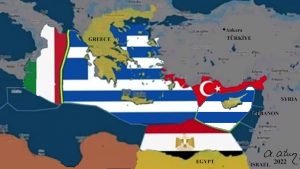





GREECE’S NATURAL GAS STRATEGY |
 |
Prof. Dr. Ata ATUN |
|
For a long time, Greece has been very concerned about losing its regional importance, not being taken into account, and not being placed in the position of a respectable state. The recent rise of Türkiye as a global actor has severely harmed Greek politicians’ morale and future plans, to the point where they have begun to plot ways to discredit Türkiye.
Their first attempt to cause problems and enter into armed conflict with Türkiye in order to expel Türkiye from the Aegean Sea was to arm the islands near the Turkish coast, in violation of the Zurich Agreement.
Other initiatives that followed included the use of the S-300 defense system against Turkish jets, which the Greek Cypriot Administration of Southern Cyprus had purchased from the Russian Federation during the Glafkos Clerides era to use against Türkiye but was forced to transfer to Greece due to Turkish political pressure.
The Greeks’ goal in this incident is clear: to incite conflict with Türkiye. As a result, it will start a war or spark a conflict between Türkiye and the West by forcing Türkiye to activate the S-400s in its possession. The (HISAR U) SIPER Block-1 air defense missile, which is more advanced than the S-400s that Greece has forgotten about and will be included in the Turkish Arms Forces inventory in 2023, has a range of 100 kilometers.

The Turkish Air Defense system has the capability and equipment to detect and destroy a military jet plane taking off from Greece in the middle of the Aegean Sea.
Türkiye has two seismic research vessels and four deep-sea drilling vessels at the moment. Its navy consists of new ships outfitted with cutting-edge technology. It goes without saying that it also has the region’s most powerful navy.
Indeed, Greece’s strategy and ultimate goal, as it is known, is to seize natural gas deposits in the Eastern Mediterranean and establish a gas empire that transports gas to Europe under its own control.
Greece, seeing Türkiye as the only impediment to its plan, is attempting to eliminate Türkiye in order to realize its dream of a gas empire.
Greece, which prefers to begin by instilling tension in order to achieve this goal, wishes to undermine all of Türkiye’s contributions to world peace, particularly in the Ukraine-Russia conflict, and to discredit Türkiye.
Its goal is to inadvertently cause problems in the Aegean Sea and the Eastern Mediterranean, pitting Türkiye against the so-called “West”, the EU and US alliance.
To use this crisis to force a portion of the Turkish Navy to deploy in the Aegean Sea and the remainder in the Eastern Mediterranean in response to Greece’s deliberate provocations. To weaken the defenses of the “Blue Homeland” by dividing Turkish Navy into two parts. To form alliances with states in the region that are hostile to or disagree with Türkiye on the basis of hostility. Encircling Türkiye along the Aegean and Mediterranean coasts and immobilizing it, as well as seizing a large portion of the Eastern Mediterranean’s natural gas reserves.
However, Greece’s Eastern Mediterranean Strategy has been a colossal failure.
The relations between the UAE, Saudi Arabia, Israel, and Egypt, in which he had put his trust and attempted to form a strong front against Türkiye, abruptly shifted. Greece’s role in the Eastern Mediterranean was quickly eroded by Türkiye’s successive moves, despite the support of France and the United States.
The world has realized that Greece’s efforts are futile and that no initiative in the Eastern Mediterranean will succeed without Türkiye and Turkish Cypriots, and Greece will realize this as well.
Prof. Dr. (Civ. Eng.), Assoc. Prof. Dr. (Int. Rel.) Ata ATUN
Dean, Cyprus Science University